Yesterday, I talked about the basics of gongfu brewing. As mentioned, the gaiwan is vital to gongfu brewing but often many shy away from using it because of the perceived difficulty of using it.
“Do what you fear most and you control fear “ -Tom Hopkins
Using a gaiwan is not difficulty but it does require two things: focus and practice.
This goes against our modern penchant towards multi-tasking and taking a “touch-and-go” activity towards experiences and activities.
Nevertheless it is precisely focus and practice that helps us get the most out of our tea, gain a deeper understanding of it and enjoy it better.
The Equipment
I don’t mean an expensive one that is painted by the most famous artists in Jingdezhen.
In fact I usually recommend cheaper ones for those who are starting out since breakage of gaiwan lids among tea lovers is common. (See here for more tips on buying a gaiwan ).
*To align our nomenclature- take a look at this picture.
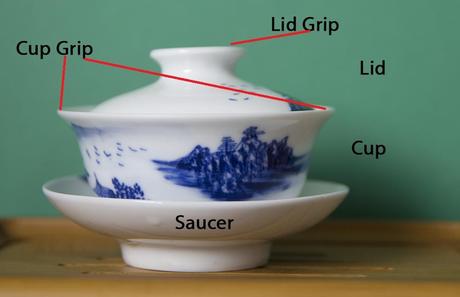
Flaring out
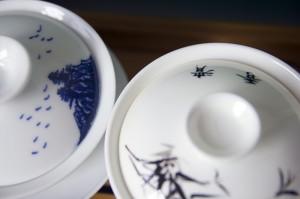
In other words, the longer the flare the further its distance from the heat source (the water) and hence the cooler it is.
Of course this has to be balanced with ergonomics.
Put a lid on it
The shape of the lid is also a consideration.
The dome shape provides insulation against the heat hence reducing the probability of scalding your fingers on the lid grip.
On the other hand, too much height on it makes it unstable and awkward to grip. Just a subtle dome would suffice.
Comfort
For beginners, I would recommend a gaiwan about 100-120cc in size which would be easier to handle.
The shape also largely depends on personal comfort as well.
Before buying one, you should try and see if you are comfortable holding it or if you are buying online, see the dimensions and mimic the spread of your fingers to see if the size of the holding area is comfortable.
Personally I would prefer one around 8-11 cm in diameters but those with bigger or small fingers might disagree.
The Technique
There are 2 main methods- the side grip and the top grip.
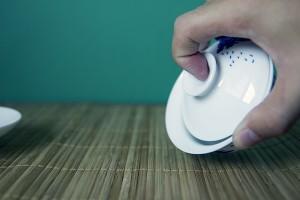 Side grip:
Side grip:

i) Use your thumb and middle finger to grip the cups
ii) Press the lid grip lightly but securely with your index finger
iii) Find an angle to allow tea to flow through but as little leaves as possible
iv) Decant
v) Move up and down to ensure as much liquid is decanted as possible
Top Grip:
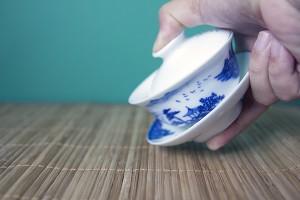
ii) The index and middle finger grips the saucer
iii) Find an angle to allow tea to flow through but as little leaves as possible
iv) Decant
v) Move up and down to ensure as much liquid is decanted as possible
Personally I find the side grip more comfortable, perhaps that was the influence of those I studied from earlier.
The Challenges
Burn baby, burn (not!)
The greatest fear is scalding our fingers because
i) Hot water splashes on our fingers
ii) The cup grip is too hot
Overcoming the first point is basically down to focus and practice.
Gripping Tales
First way to avoid the heat is minimize the time spent gripping it.
You can start by practicing with teas that are bigger and more uniform such as Taiwanese and Minnan Oolong.
Hence you can use a pretty big angle so the water can flow through quickly (but not the leaves) and avoid holding the vessel for too long.
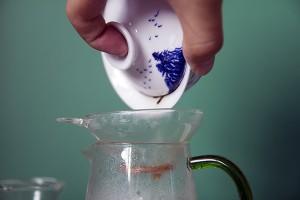
The second thing to note is avoid excess water on the lid since it basically makes the cup grip hotter.
Just cover completely and gently tip out the excess water.
Third is to reduce the infusion time.
Minnan and Taiwanese Oolongs are again good for practice since their recommended infusion time starts off in 30 seconds region.
Shorter infusion times means the heat conducted to the cup grip is lesser as well.
In addition, try using a chahai (fairness cup) since you would need one in order to use a filter and it reduces the infusion time instead of the need for “General Guan Patrolling the City” which would extend the holding time by a good 30 seconds.
Alternatively you could try a shouzhuawan, the grips and the spout makes it easier and faster to pour. Helps you gain your confidence in gongfu brewing.
Most Importantly Remember
Burns heal.
Just like every guitarist has calluses on their fingers, there are bound to be battle scars. But it heals.
Now don’t let me keep you from your gaiwan practice.
See more articles related to brewing tea
